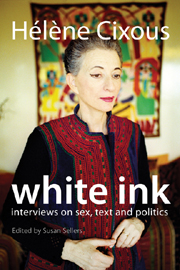Book contents
- Frontmatter
- Contents
- Acknowledgements
- Editor's note
- Preface: On being interviewed
- Part I Writing the enigma
- 1 The play of fiction
- 2 The novel today
- 3 Literature suspends death
- 4 In the beginnings, there were many …
- Part II Writing the feminine
- Part III Writing and politics
- Part IV Writing and theatre
- Part V Writing roots
- Part VI On painting, music and nature
- Part VII Dialogues
- Envoi: But the Earth still turns, and not as badly as all that
- Bibliography of Hélène Cixous's works
- Index
2 - The novel today
from Part I - Writing the enigma
- Frontmatter
- Contents
- Acknowledgements
- Editor's note
- Preface: On being interviewed
- Part I Writing the enigma
- 1 The play of fiction
- 2 The novel today
- 3 Literature suspends death
- 4 In the beginnings, there were many …
- Part II Writing the feminine
- Part III Writing and politics
- Part IV Writing and theatre
- Part V Writing roots
- Part VI On painting, music and nature
- Part VII Dialogues
- Envoi: But the Earth still turns, and not as badly as all that
- Bibliography of Hélène Cixous's works
- Index
Summary
This interview is taken from “Le Roman d'aujourd'hui: Entretien: Hélène Cixous” [The Novel Today: Interview: Hélène Cixous] which appeared in Fabula 3 (March), 147–58, 1984.
hq To begin with, I will simply say this: as we all know, you have various activities to your credit. What part does literature play in all of this?
cixous There is this effect of multiplicity which you describe, but, at the heart of it, there is an order, at least a hierarchy of values, and for me, the most essential thing is to write. The other gestures, which are accompaniments, have their roots in writing. For example, I write during the summer and, from what I have written, I bring out what will be the general theme of my seminar. It is the world of writing which is originary, which is the origin of everything I am able to do next; it's the source. Afterwards, it disperses, it channels itself, it scatters forth in secondary gestures which, for me, are still necessary gestures all the same. Well, they are gestures of quick transmission. The very fact that they are quick means that they are also less profound, more shrunken gestures. The difference is situated in the transmission — I will say the mission — from writing to the spoken word; but the one serves the other.
hq Does that mean that you speak, that you teach, as you write?
cixous I do not think that I speak as I write, exactly.
- Type
- Chapter
- Information
- White InkInterviews on Sex, Text and Politics, pp. 15 - 25Publisher: Acumen PublishingPrint publication year: 2008
- 1
- Cited by

